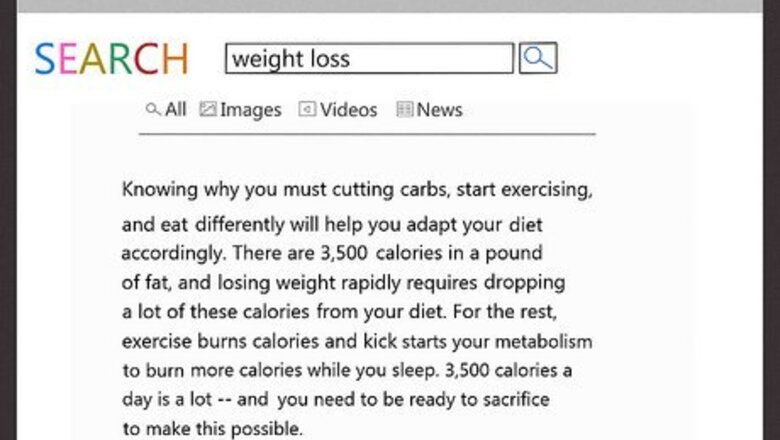
views
- Keep track of your calorie intake for 1-2 weeks before you start. You'll need to eat roughly 1,000 calories less than you normally do to drop a pound every day.
- Drop carbs from your diet and focus on eating fresh veggies and lean proteins.[1]
- Aim for 1 hour of aerobic exercise every day to help you burn enough calories.
Eating to Lose Weight
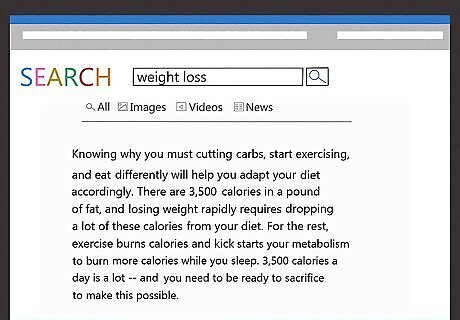
Understand the science behind weight loss. Knowing why you must cutting carbs, start exercising, and eat differently will help you adapt your diet accordingly. There are 3,500 calories in a pound of fat, and losing weight rapidly requires dropping a lot of these calories from your diet. For the rest, exercise burns calories and kick starts your metabolism to burn more calories while you sleep. 3,500 calories a day is a lot -- and you need to be ready to sacrifice to make this possible. It won't be a comfortable 7 days, but you can get through it if you keep your end goal in sight. A calorie is a calorie. This means that, at the end of the day, weight loss is about decreasing the number of calories you eat, no matter what source they're from. A professor in Kentucky once ate Twinkies and lost 27-lbs to prove this point. How? He ate very, very few. If you feel dangerously nauseous, light-headed, woozy, or tired while on this diet. stop and have a snack. You can still lose a lot of weight by following the basic tenants of this diet, even if you need to "cheat" for your safety once or twice.
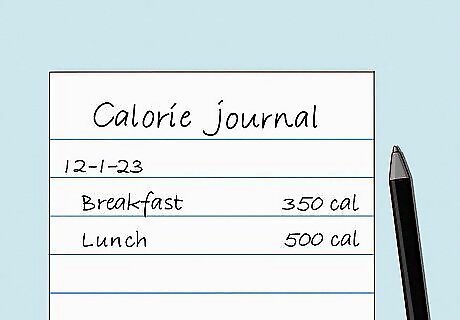
Keep a log of your normal caloric intake for 1-2 weeks before starting. Get a dieting app, use a calorie counting website, or simply write down your calories in a journal. You need to know how many calories you eat each day to figure out where your diet can change. You will need to eat roughly 1,000 or fewer calories a day to drop a pound every day for a week.
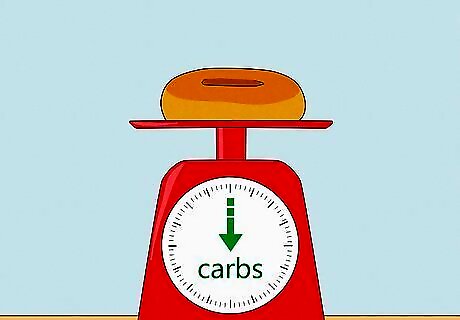
Drop carbs from your diet. If you can do this slowly, before your one-week challenge, you'll have the best results. Carbs are a dietary staple, but they hold a lot of water weight (binding to more water than fat or protein) and are easy to overeat. Try to get yourself below 50g of cards (roughly a scoop of pasta) a day. Switch spaghetti squash for pasta -- it contains less than 1/4 of the calories. Swap an English Muffin for bagels or hamburger buns to save 100 calories. Make a taco salad instead of a burrito. Try to slowly lower your carb diet in the 2-3 weeks before the major weight loss. You body will adapt to the change, and by the time your "7 days-7pounds" comes around your body will be ready to drop the weight. That said, dropping carbs for one week will still make a difference.
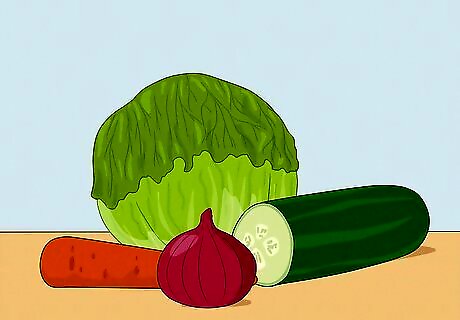
Stick to vegetables. It is very hard to overeat vegetables. That's not a joke about how vegetables taste bad, that's actual science based on the concept of a "bliss point," which is the amount of calories you need to eat to feel full. Processed foods are specifically made with higher bliss points, but the all-natural goodness of vegetables allows you to eat fewer calories and still feel full. Make a salad with your favorite fruits and vegetables: lettuce, carrots, tomatoes, cucumbers, kale, celery, apples, strawberries, red onions, etc. Keep the dressing to a bare minimum;1-2 teaspoons of oil and vinegar is your best bet.
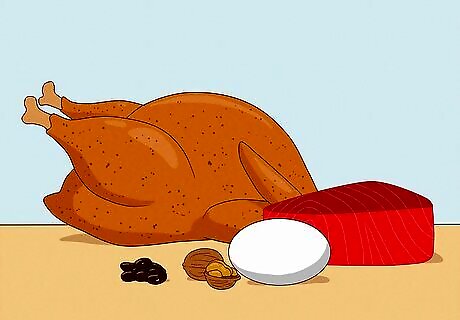
Eat lean proteins to feel full and get lasting energy. Once you've subbed out carbs, you'll likely feel constantly hungry. You can avoid this, however, by making a source of lean, fat-free protein a part of every meal. Some proteins to include in your diet are: Grilled or baked chicken. Beans, chickpeas, and legumes. Tuna and other white fishes. Nuts Eggs
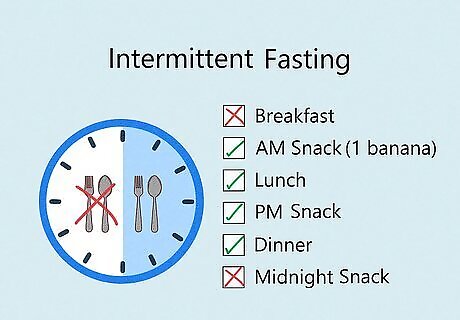
Reschedule your meals for intermittent fasting (IF). IF is one of the best ways to lose weight fast, but no one ever said it was fun. Most commonly, IF involves skipping breakfast, leading to 18 hours or more between meals. Instead of breakfast, eat a single banana when you wake up as a snack. Then you can eat lunch and dinner, with a small snack in between (especially if you're exercising) and start again the next day. This is only a strategy for short-term weight loss. A balanced breakfast each morning is important for long-term dieting, as skipping breakfast often leads to overeating later on. Fasting can increase fat oxidation, helping you shed fat weight much quicker.
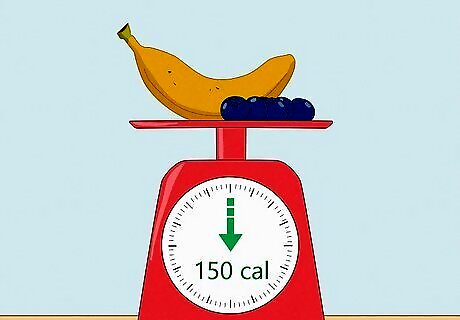
Keep snacks below 150 calories each. Many companies make "snack packs," and low-cal options, and indulging in something sweet, if in moderation, can actually prevent overeating later. That said, you want to space these snacks out. Instead of having that single low-cal cookie right after lunch, as dessert wait 1-2 hours and have it as a snack. This will keep you less hungry for longer and make it easier to space out your calories. Some good snacks include: A banana A handful of berries. 1-2 tablespoons of nuts. Low-cal bars, snacks, and energy drinks.
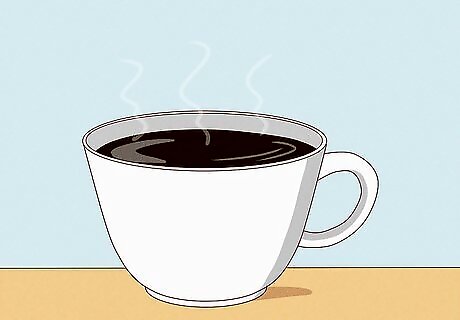
Have a glass of coffee or green tea. Caffeine, when taken in moderation, is an effective appetite suppressant. While there is no strong evidence that caffeine consumption leads to long-term weight loss, it can help you make short term gains by increasing your metabolism and simultaneously turning down your appetite.
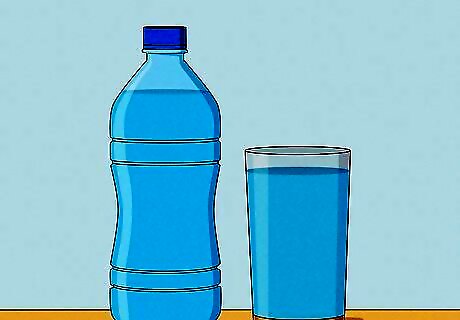
Drink water regularly to ease hunger pains. Regular water drinkers have a much, much easier time avoiding snacks or overeating, so keep a water bottle on hand throughout the entire day. When you're hungry in between meals, sip some water-- it will likely hold you over until meal time.
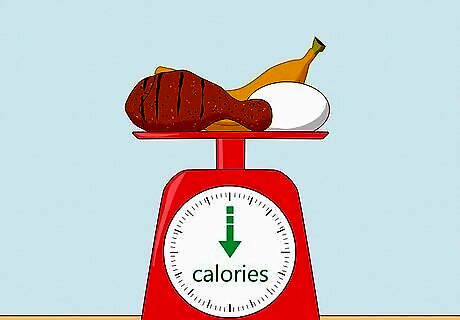
Know that an effective diet will contain very few calories. You will not be eating a whole lot of food to lose weight. A diet for rapid weight loss should be around 1,000 calories a day, which is eaten up faster than you might think. A sample diet (including breakfast) could include: Breakfast: An apple, a hard boiled egg, and a handful of nuts. Lunch: Small piece of grilled chicken, 1 cup of low-fat yogurt, banana. Snack: Small salad. Dinner: 1-2 hard boiled eggs, cucumber, pepper, and chickpea salad. You can also try out these meals, each under 300 calories.
Maintaining an Active Lifestyle
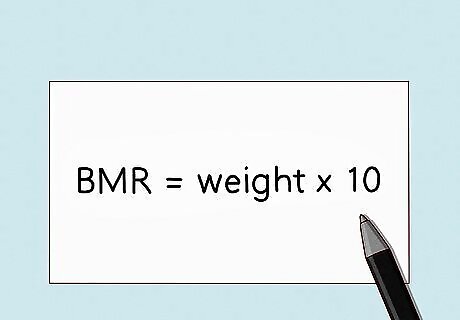
Find your basil metabolic rate (BMR) to determine how many calories you burn without exercise. To do so, multiply your weight by 10. This is, roughly, how many calories you burn in a day just by existing (a 20lb man burns roughly 2000 lbs). Many websites offer BMR calculators that will get you a more accurate number, as well. Knowing your BMR is essential to determining how many additional calories you need to burn through exercise. For example: You've cut your diet to a measly 1,200 calories a day for the week. Your BMR is 2,200 calories a day. This means that, if you didn't move all day, you'd burn that many calories. You have a 1,000 calorie deficit. This means you need to burn an additional 2,500 calories each day to lose a pound each day.
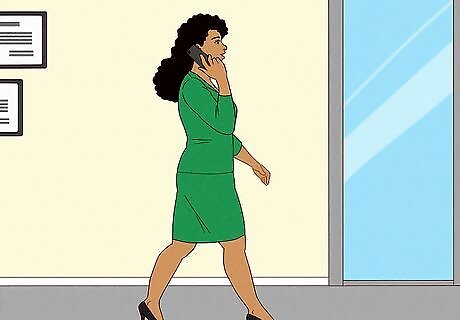
Walk or bike everywhere you can. You want to be moving as frequently as possible. This includes small moments, such as taking your business call out for a walk around the block or standing on the subway. Take advantage of every chance you get to burn calories. Do sit-ups or push-ups while watching TV, especially during commercials. If you can, work standing up, or bring a set of small weights with you to "lift" during downtime at your desk. Take a short walk around the office every hour at work.
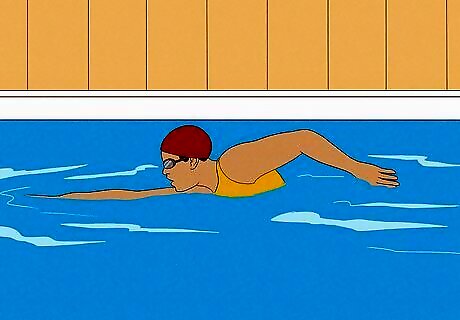
Do roughly 1 hour of aerobic exercise every day, at a minimum. This is absolutely necessary to burn calories, and the longer you can make yourself exercise, the better your results will be. Aerobic exercise is any work-out that raises your heart-rate, like running, biking, swimming, or spinning. Some suggestions, which each burn 500-1000 calories, depending on intensity, include: 1-hour cycling. 90 minute Pilates class. 1-hour dancing. 2 hour hike.
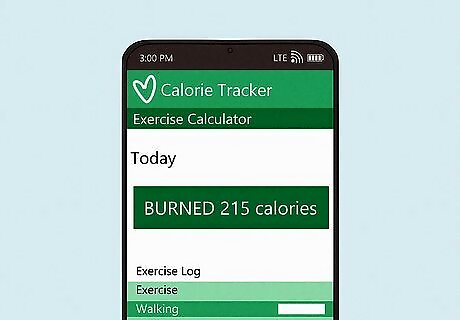
Track the number of calories you burn. This is easier than ever in the information age, as there is a litany of apps and programs that help you track your calorie expenditure. Check your smartphone's app library for a calorie tracker, or go online at the end of the day search for "exercise calorie counter" and input all of your day's activity. This step is crucial to ensure that you get the right amount of weight off, each day.
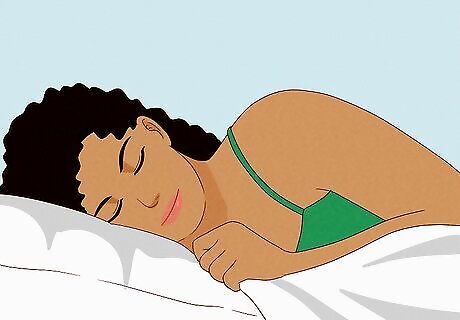
Get enough sleep every night. Getting to bed early is proven to help with weight loss. It helps prevent overeating, and it lets your body do what it does best in rest -- digest. Try to get to bed early enough to ensure 8 hours of sleep each night. Regular sleep gives you the energy to exercise. Sleep-deprived individuals are clinically proven to have higher cravings for junk-food.
Keeping the Weight Off
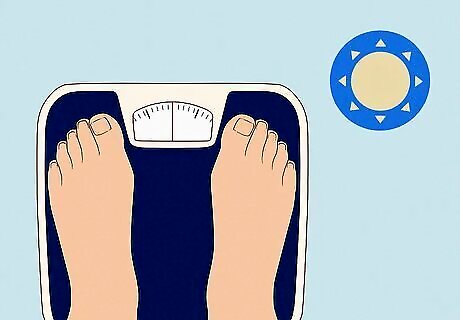
Weigh yourself first thing in the morning, every morning. This is the most accurate time to get your weight, before food and water have artificially upped it. Step on the scale in your underwear and make a note of your current weight. Keeping a small journal of your weight fluctuations is proven to keep you on track with your weight-loss goals.
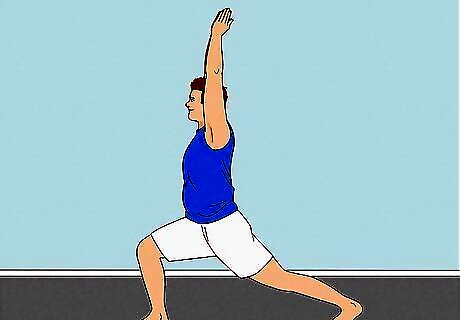
Maintain a regular exercise routine. It doesn't have to be the same routine that you used to burn the weight, but you need to do something. People who have gained significant weight and spent months not exercising have slower metabolisms, and will have to work harder than someone who was never overweight to keep the weight off. While this is not a fun reality to face, knowing this fact is important to prevent regaining your 7 lbs. Walk 2-3 miles a day, 4-5 days a week. Sign up for a yoga, aerobic, or spinning class to ensure an hour of exercise 1-2 times a week. Aim to work out 4-5 times a week, not 1-2 for a long period of time. Regular exercise is better for your metabolism than occasional long runs.
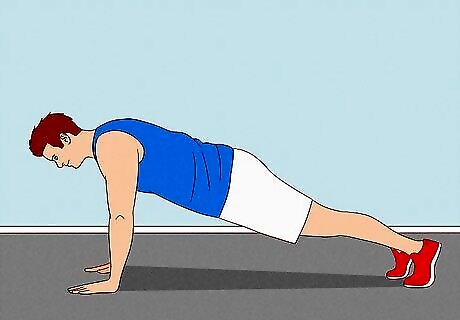
Add strength training to your workout regime. Muscle building, through weight lifting and strength training, is essential for a fully functioning metabolism that keeps the weight from coming back. You should build muscle 2-3 times a week, work on push-ups, sit-ups, dips, and planks, all exercises you can do at home. If you can, get a gym membership so you can work on muscle building every week.
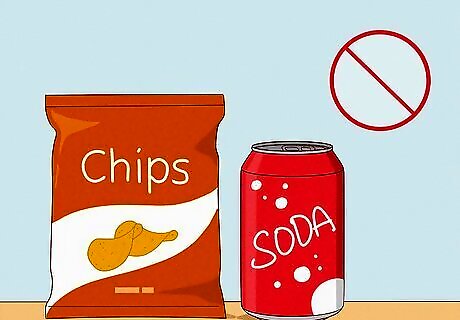
Overhaul your snack options. Keeping chips and soda in the house, even if you tell yourself they are "just as an occasional treat," means that you will eventually eat them. But if you cut the temptation before the chips even enter the house you will be much more successful at dieting. Just don't buy junk food, and don't keep it in the cabinets. You'll be surprised how little temptation you have when there is nothing around to tempt you. Go to the grocery store with a list and stick to it. You can plan your meals more effectively from home and ensure that you only buy healthy options.
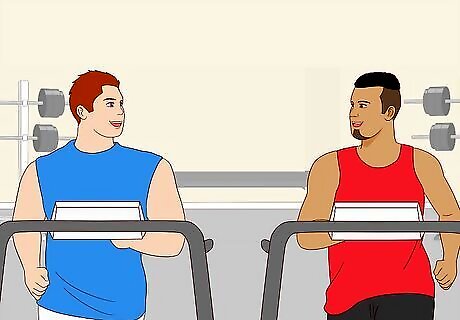
Get a weight-loss buddy. Have someone else around to keep you honest, go to the gym with you, and come up with good, low-calorie recipes. Building a social support system is important for keeping your new lifestyle permanent. Surround yourself with good influences, such as other people who want to eat healthy and make exercise a part of their daily life, and you'll keep the weight off naturally.
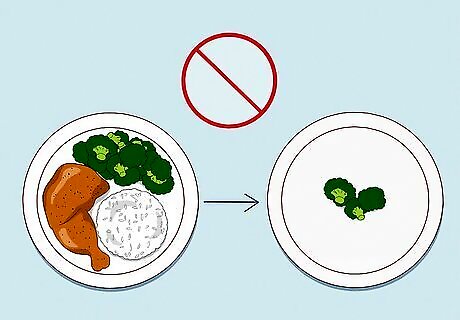
Consider trying to lose the weight slowly. Making a rapid diet switch in an attempt to lose weight quickly often leads to "rebound weight." This happens when, after a grueling 7 days of dieting, you are unable to maintain the extreme habits and instead slide back into bad ones. After your diet is complete, work on gradually shifting your lifestyle to something healthier instead of trying to become super-fit over night. Make time to exercise for 30 minutes 4-5 times a week. Substitute one of your normal meals, such as breakfast, with the new low-cal option. Keep track of your calories -- it prevents you from large swings back towards overeating.













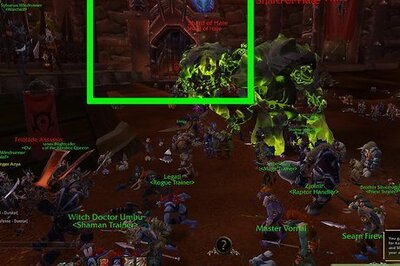



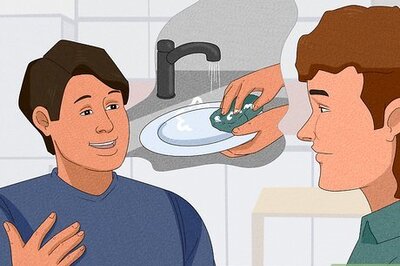

Comments
0 comment